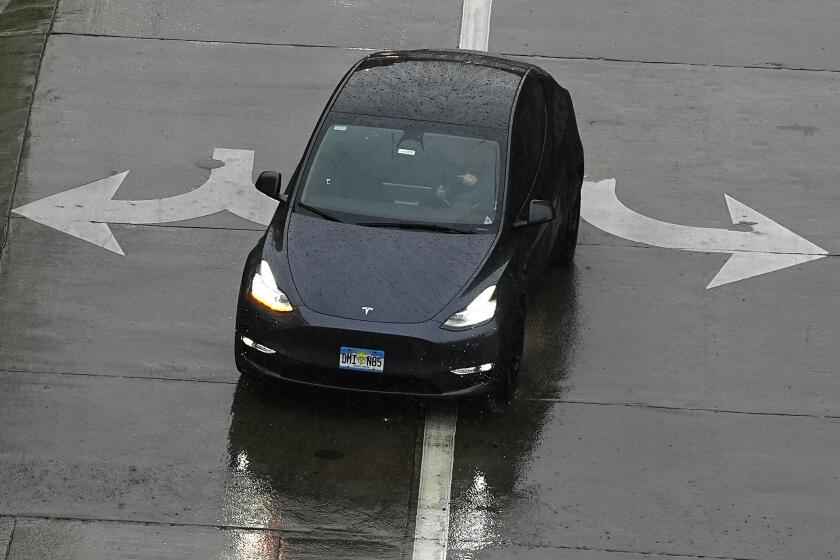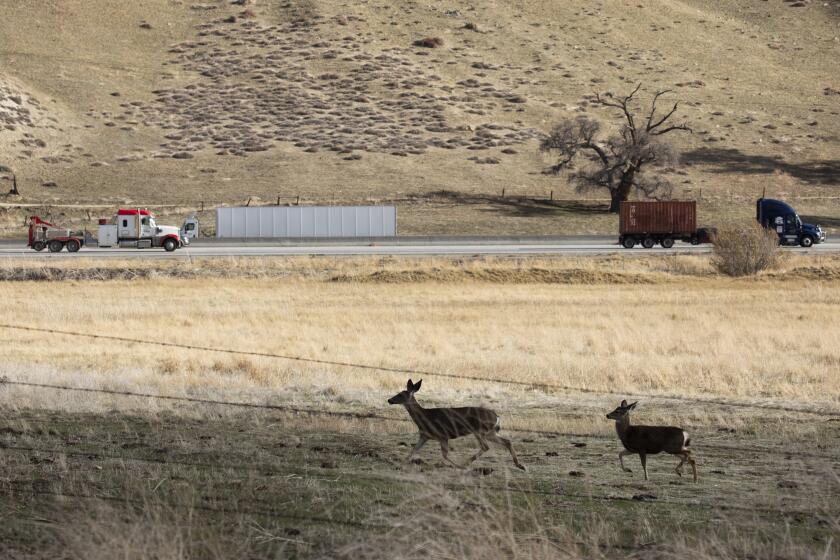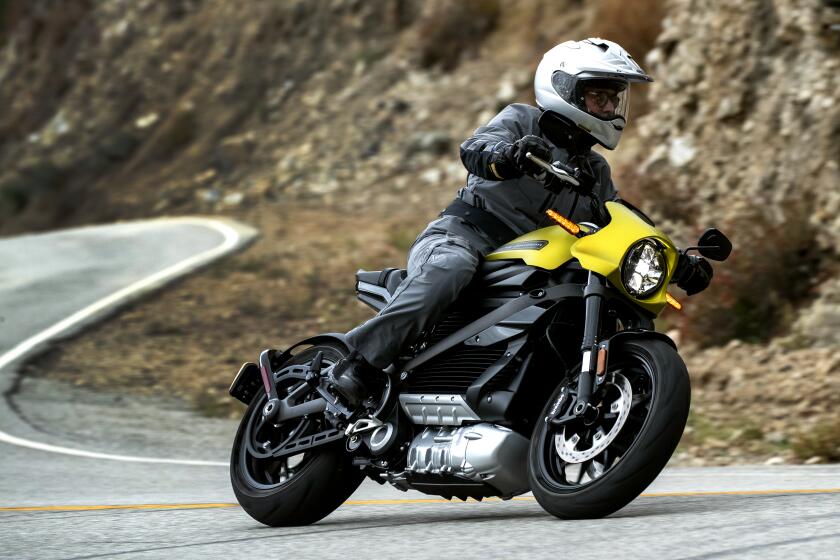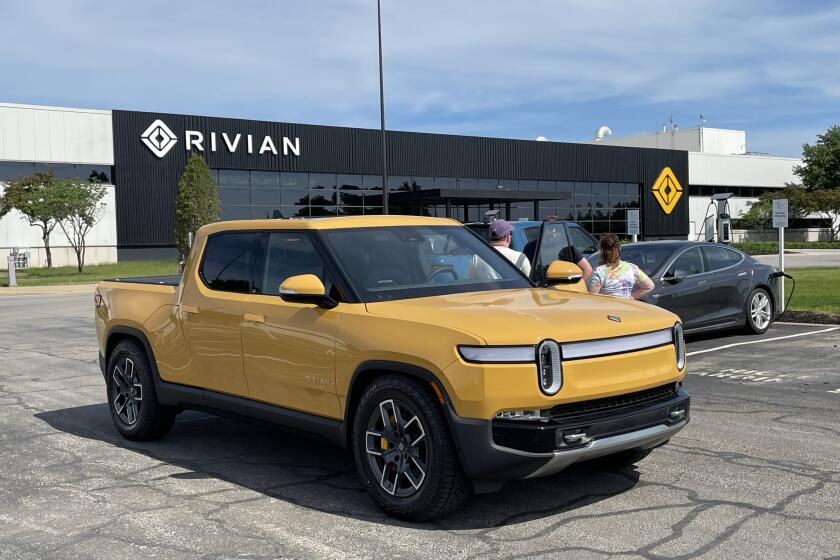Firms Offer to Make Electric Cars in ‘96-’97 : Environment: Proposals by auto manufacturers seek to end impasse with state over zero-polluting mandate.
U.S. and Japanese auto makers have agreed to produce electric cars for California in 1996 and 1997, an offer that could break an impasse between the Wilson Administration and the auto industry over the state’s landmark zero-polluting car mandate, high-ranking state officials said Tuesday.
General Motors, Chrysler, Ford, Toyota, Honda, Nissan and Mazda on Monday night sent detailed individual proposals to the California Air Resources Board that one Wilson Administration source called “very positive” and “highly promising.”
Details were sketchy, but several auto companies agreed to produce “several thousand” electric cars for sale over the next two years and to manufacture “large numbers” of advanced batteries for cars beginning in 1998, said the official, who requested anonymity because of ongoing negotiations with the companies.
Under California’s hotly contested mandate, 2% of cars sold by major manufacturers must be exhaust-free beginning in 1998. That amounts to about 22,000 electric cars per year, with the mandate increasing to 5% of annual sales in 2001 and 10% in 2003.
Speculation has been widespread that the Wilson Administration would ease the 1998 requirement under intense pressure from the auto and oil industries. The Big Three--General Motors, Ford and Chrysler--and U.S. oil companies have launched efforts to roll back the mandate, including massive advertising campaigns targeting the car-buying public.
Environmentalists worry that if a deal is struck, it might put only a small number of electric cars in showrooms and substantially ease the clean air goals.
“There is some movement from all parties, but I can’t tell if it smells like a skunk or a rose right now,” said Veronica Kun of the Natural Resources Defense Council.
“Our bottom line is a commercial program has to start in a meaningful way in 1998,” she said. “What we need is a real market launch, not simply a few hundred demonstration vehicles. The people of California are ready to buy electric cars.”
Air quality sources declined to reveal the individual offers from auto companies because the information is considered a trade secret. They also would not outline how many cars the manufacturers collectively offered to produce each year or how the total compares to the mandate.
Sources said the offers need to be evaluated by the Air Resources Board’s technical staff and will require further negotiation.
The board is expected to discuss the offers and give direction to its staff at a meeting in Sacramento on Thursday.
Likewise, auto industry officials declined to divulge any details, saying the offers are being guarded so carefully at this point that only a few representatives of each company are aware of them.
“A healthy conversation is going on, but I cannot talk about the details,” said Reg Modlin, manager of environmental affairs at Chrysler. “We have urged some sort of easing into the market instead of the shock approach of dumping a bunch of the cars on the market and trying to sell them. . . . You can’t jam this down people’s throats.”
Auto makers contend that lead-acid batteries to power electric cars are too expensive and their range far too limited to be acceptable to large enough numbers of consumers to achieve the mandate’s requirements.
An independent review panel created by the Wilson Administration reported last month that electric cars with battery ranges under 100 miles could be manufactured by 1998, but more practical, advanced battery technologies won’t be ready for mass production until 2000 or 2001.
Modlin said the new proposals mirror those concerns, and although he has not seen the other companies’ offers, he doubts that there is anything in them that promises large-scale introduction of the cars before 2000.
Chrysler Chairman and Chief Executive Officer Robert Eaton met with the governor last week, and other auto and oil industry representatives have been visiting Sacramento in recent days to try to sway the agency’s decision.
Eaton said his company plans to manufacture an electric minivan “in time for the 1998 model year,” but they “will cost too much, they won’t have enough power, and they won’t give the consumers what they want.”
James M. Strock, the governor’s top environmental aide, declined to comment on the auto industry offers. But in a speech in Los Angeles Tuesday, he warned that the mandate will stand unless car manufacturers come up with an enforceable regulation to replace it.
“To the extent that auto makers propose an interim alternative to the . . . mandate in 1998, they must provide pollution reduction benefits significantly greater than those provided by the current regulation,” Strock said.
“Furthermore, the auto makers would have to provide clear, enforceable commitments for accelerated research, development, testing and commercialization of zero emission vehicles, beginning immediately.”
Strock’s comments, while leaving plenty of maneuvering room, are the most pointed in outlining the Wilson Administration’s stance. Many insiders and observers believe that the board’s staff will recommend lowering the number of electric cars required during the initial three years.
Strock said the 1998 mandate has “practical difficulties” because “there is a risk . . . that technology development could be frozen at too low a level . . . and could be therefore rejected by the public.”
John White, a Sierra Club lobbyist in Sacramento, said Strock’s comments “could be a pretext for selling out the mandate” and turning to a voluntary or small-scale demonstration program.
“They want to wind up with something that looks and sounds and feels sort of like the mandate,” he said.



